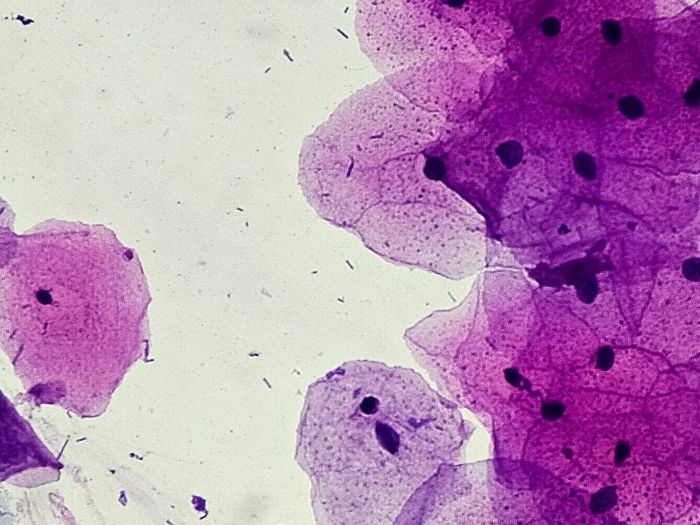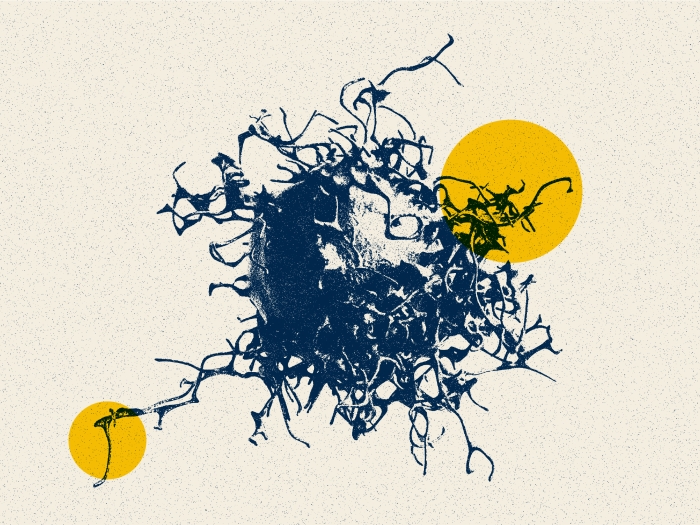When white blood cells, meant to protect the body from infection, overly activate, patients are more likely to develop a potentially severe reaction
10:09 AM
Author |

A study from the University of Michigan Health Rogel Cancer Center reveals a connection between the most common type of white blood cells, which act as a first defense in the body’s immune system, and a severe complication of CAR T-Cell immunotherapy.
The findings, out now in Blood Advances, show that a process called NETosis, in which neutrophils eject their DNA to create webs, may contribute to the development of cytokine release syndrome (CRS), a potentially life-threatening hyper-activation of the immune system.
Further, the team, led by Muneesh Tewari, M.D., Ph.D., Ray and Ruth Anderson-Laurence Sprague Memorial Research Professor in the Department of Internal Medicine, and Sung Won Choi, M.D., M.S., Edith S. Briskin and Shirley K. Schlafer Foundation Research Professor of Pediatrics, identified certain proteins that are biomarkers of NETosis and could predict which patients are likely to develop CRS before they develop symptoms.
Tewari explains that there are FDA-approved drugs that can be used to affect neutrophils, like disulfiram used to treat alcohol abuse.
Though typically prescribed for other conditions, these drugs could be leveraged to inhibit NETosis and prevent CRS.
“We identified biomarkers that are part of the ‘nets’ the neutrophils cast, and an indication that CRS is likely to occur,” Tewari said.
“In addition to this strong correlation, we hypothesize that NETosis is also contributing to the development of CRS. We want to test this idea in preclinical models, and eventually in clinical trials, to see if we can inhibit the net formation and reduce the risk of CRS in patients.”
Over 70% of patients develop cytokine release syndrome; about 15%-20% of those cases are severe and could require admission to an intensive care unit because of low blood pressure, increased heart rate, shortness of breath, or major organs shutting down.
Patients can develop cytokine release syndrome within a week after receiving CAR T-cell infusions.
Tewari explains that little is known about the mechanisms happening during that first week, before CRS symptoms are present.
Given this lack of knowledge, the research team used proteomics analysis to measure hundreds of proteins in blood samples from patients who underwent CAR T-cell therapy, both those who went on to develop CRS and those who didn’t.
“We found dozens of proteins that seem to be different in patients who go on to develop CRS versus those who don’t. We also found less than 10 proteins that seemed to be different before patients developed CRS, even before they got the treatment,” Tewari explained.
The team also analyzed what proteins in the blood plasma change over time as CRS developed.
“We noticed that neutrophil-related proteins were coming up. That tipped us off to think more about neutrophils specifically, which let us to NETosis,” Tewari said.
The process of NETosis is like its name suggests.
When neutrophils are triggered, which normally might happen at the onset of a bacterial infection, for example, they eject their DNA, which is packed tightly inside the nucleus, into structures resembling “nets” that can capture and contain the bacteria.
In patients that go on to develop CRS, Tewari explains that while there is “no bacteria, per se,” the neutrophils are confused and act as though there’s an invader.
“We don’t yet know why, but in some patients, their neutrophils are already triggered and on high alert. They’re already forming these nets, which activates the entire immune system and makes their bodies more prone to over-react by making a flood of cytokines, producing CRS.”
In addition to pursuing clinical trials to see if certain FDA-approved drugs can help suppress NETosis, Tewari says this study could help reveal how stress affects the body on a cellular level.
“We’re seeing more and more how a triggered immune system makes a difference in terms of outcomes, especially with cytokine release syndrome,” Tewari said.
“There’s early data to suggest that psychological stress can affect neutrophil function. This study is another piece of the puzzle that could lead to more insights into how stress can negatively impact the body and contribute to illness.”
Funding: This work was supported by a Taubman Medical Institute Grand Challenge grant and Taubman Medical Institute Innovation Project grant. S.W.C. is currently supported by NHLBI grants R01HL146354 and K24HL156896 (for mentoring) and NCI grant R01CA249211. C.F. was supported by an NHLBI T32 training grant (T32HL007622). C.B. is supported by St. Baldrick's Foundation and Hyundai Hope on Wheels Scholar Awards.
COI: M.T., S.W.C., C.F., Y.Z., J.S.K., and D.G.F. are inventors of a CRS biomarkers–related invention, for which the University of Michigan is pursuing patent protection. T.J. has participated in an advisory board with Kite Pharma. The remaining authors declare no competing financial interests.
Additional authors: Christopher Flora, Mary Olesnavich, Yu Zuo, Erin Sandford, Rashmi Madhukar, Michelle Rozwadowski, Kavya Sugur, Andrew Ly, Ata Alpay Canbaz, Audra Shedeck, Gen Li, Marcus J. Geer, Gregory A. Yanik, Monalisa Ghosh, David G. Frame, Challice L. Bonifant, Tania Jain, Jason S. Knight
Paper cited: “Longitudinal plasma proteomics in CAR T–cell therapy patients implicates neutrophils and NETosis in the genesis of CRS,” Blood Advances. DOI: 10.1182/bloodadvances.2023010728
Live your healthiest life: Get tips from top experts weekly. Subscribe to the Health & Wellness newsletter by Health Lab
Headlines from the frontlines: The power of scientific discovery harnessed and delivered to your inbox every week. Subscribe to Health Lab’s Research & Innovation newsletter
Like Podcasts? Add the Michigan Medicine News Break on Spotify, Apple Podcasts or anywhere you listen to podcasts.

Explore a variety of health care news & stories by visiting the Health Lab home page for more articles.

Department of Communication at Michigan Medicine
Want top health & research news weekly? Sign up for Health Lab’s newsletters today!




